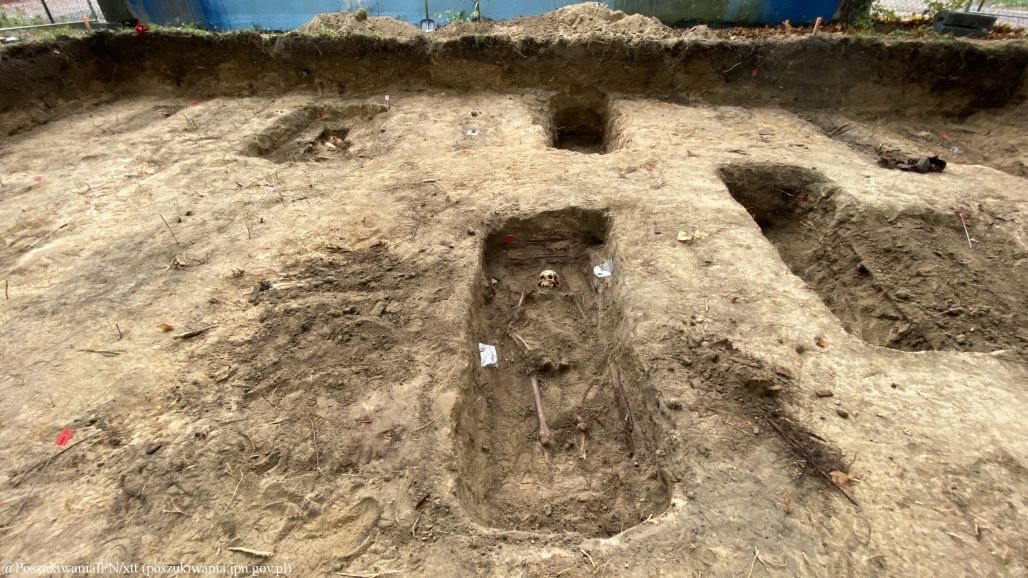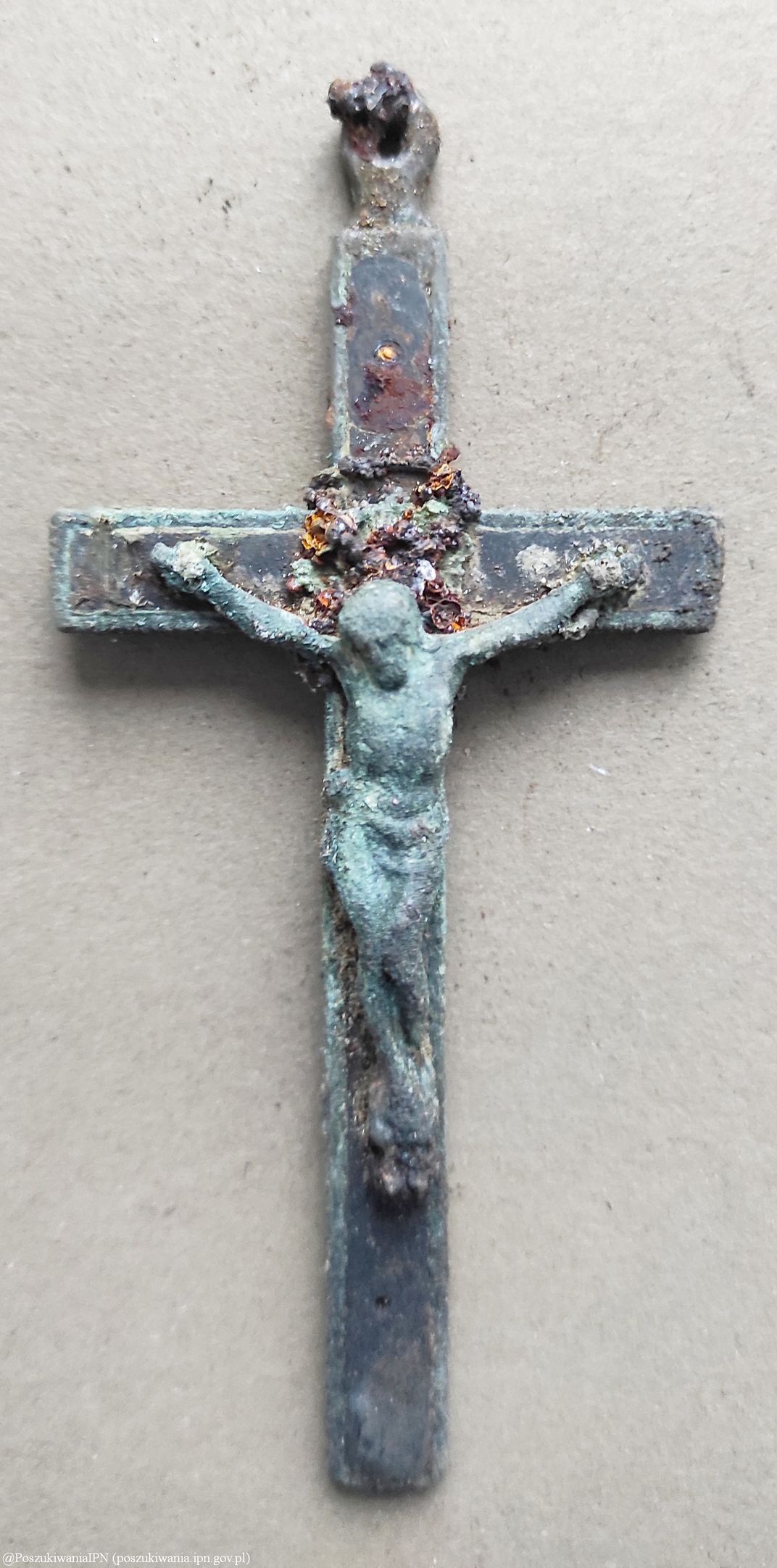Researchers Uncover Remains of Polish Nuns Murdered by Soviets During WWII
As the Red Army pushed the Nazis out of Poland in 1945, soldiers engaged in brutal acts of repression against civilians
:focal(760x576:761x577)/https://tf-cmsv2-smithsonianmag-media.s3.amazonaws.com/filer/ab/01/ab01518b-08f1-44d9-a353-3eba861ebba4/80-547652.jpg)
Researchers in Poland have discovered the remains of three Catholic nuns killed by Soviet troops toward the end of World War II.
As Sebastian Kettley reports for the Express, a team from the Polish Institute of National Remembrance (IPN), which investigates crimes committed in the country by Nazi and communist forces, uncovered the women’s skeletons in Orneta, a village in northern Poland, last December.
The dig marked the culmination of a months-long search for the bodies of seven nuns from the order of St. Catherine of Alexandria. Murdered in 1945, during the Russian Red Army’s “liberation” of Poland and subsequent seizure of power, the sisters were among the hundreds of thousands of Polish civilians targeted by the Soviets during and after World War II.
Per the IPN, archaeologists had previously found the bones of Sister Charytyna (Jadwiga Fahl) and three nuns who’d served as nurses at St. Mary’s Hospital—Sisters Generosa (Maria Bolz), Krzysztofora (Marta Klomfass) and Liberia (Maria Domnik)—in Gdańsk and Olsztyn, respectively.
The team drew on archival records to locate the final three nuns’ resting place: a 215-square-foot graveyard in Orneta, writes Mindy Weisberger for Live Science. According to a statement, the exhumed skeletons’ age and sex, in conjunction with necklaces, crosses and religious garments buried nearby, gave the researchers probable cause to identify them as Sisters Rolanda (Maria Abraham), Gunhilda (Dorota Steffen) and Bona (Anna Pestka).
Many of the nuns suffered brutal deaths: Krzysztofora, for instance, sustained 16 bayonet wounds and had both her eyes and tongue gouged out, according to an October 2020 IPN statement. Generosa, meanwhile, succumbed to her injuries after ten days of torture, as Kettley pointed out in a 2020 Express article.
Seventy-six years after World War II drew to a close, Russia’s treatment of Poland during and after the conflict remains a significant source of tension between the two nations. On September 17, 1939, just 16 days after Nazi Germany began the war by invading western Poland, Josef Stalin’s Red Army invaded eastern Poland, promptly annexing the territory in what Deutsche-Welle’s Magdalena Gwozdz-Pallokat describes as the Soviets grabbing “their share of the spoils when Poland was as good as defeated.”
In the brief period between Stalin’s annexation and the Nazis’ capture of eastern Poland in the summer of 1941, the Soviets engaged in brutal acts of repression, including the 1940 Katyn massacre of nearly 22,000 Polish citizens. As the Red Army regained control of the region in late 1944 and early 1945, violence against Poles—particularly clergy, military, educators and others viewed as threats to communist rule—resumed: “Far from being a ‘liberator,’” wrote Polish Prime Minister Mateusz Morawiecki in a 2020 op-ed for Politico, “the Soviet Union was a facilitator of Nazi Germany and a perpetrator of crimes of its own.”
As Jonathan Luxmoore reported for the National Catholic Reporter’s Global Sisters Report in 2019, Soviet soldiers killed more than 100 sisters from the St. Catherine order alone during the 1945 reinvasion of Poland. Religious orders, Luxmoore added, “were seen as secretive organizations threatening the officially atheist Communist Party’s absolute power, so they became key targets for repression.”
The seven nuns at the center of the recent excavations likely died in February 1945, when Soviet troops arrived at the hospitals in Gdańsk-Wrzeszcz, Olsztyn and Orneta, according to Live Science. As the nuns attempted to protect their patients, the soldiers brutally retaliated.
Now, researchers are trying to learn more about these women’s lives. Per the October 2020 statement, pathologists at the Forensic Medicine Institute in Gdańsk are analyzing the skeletons to confirm their identities; religious officials in Poland are also seeking beatification for the murdered St. Catherine sisters.
“If we do not want a repeat of the cataclysm of World War II, the truth about the crimes of totalitarianism—Soviet and German—as well as their condemnation have to be a foundation upon which historical education and international relations rely,” an IPN spokesperson tells the Express.
/https://tf-cmsv2-smithsonianmag-media.s3.amazonaws.com/accounts/headshot/Isis_Davis-Marks_thumbnail.png)
/https://tf-cmsv2-smithsonianmag-media.s3.amazonaws.com/filer/49/b0/49b0f8c2-e3c8-46e8-bfe4-70818680804a/103-35696.jpg)
/https://tf-cmsv2-smithsonianmag-media.s3.amazonaws.com/filer/0b/7a/0b7a6ba6-3cc8-4576-bb2f-a32eaf0bfb3b/103-35663.jpg)
/https://tf-cmsv2-smithsonianmag-media.s3.amazonaws.com/filer/2d/98/2d9818ed-9e63-4c74-907f-e0494f1f7dcc/103-35749.jpg)


/https://tf-cmsv2-smithsonianmag-media.s3.amazonaws.com/accounts/headshot/Isis_Davis-Marks_thumbnail.png)